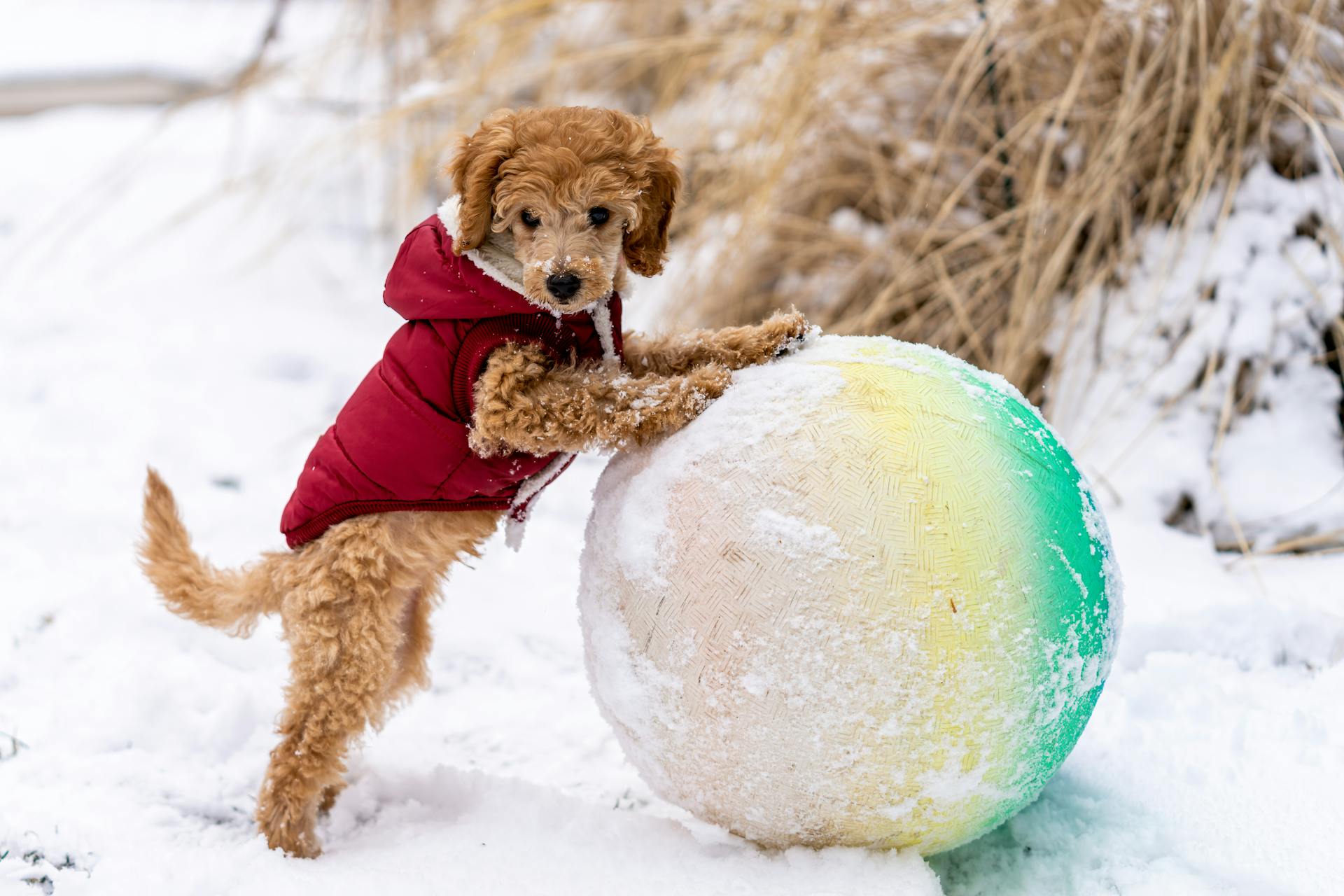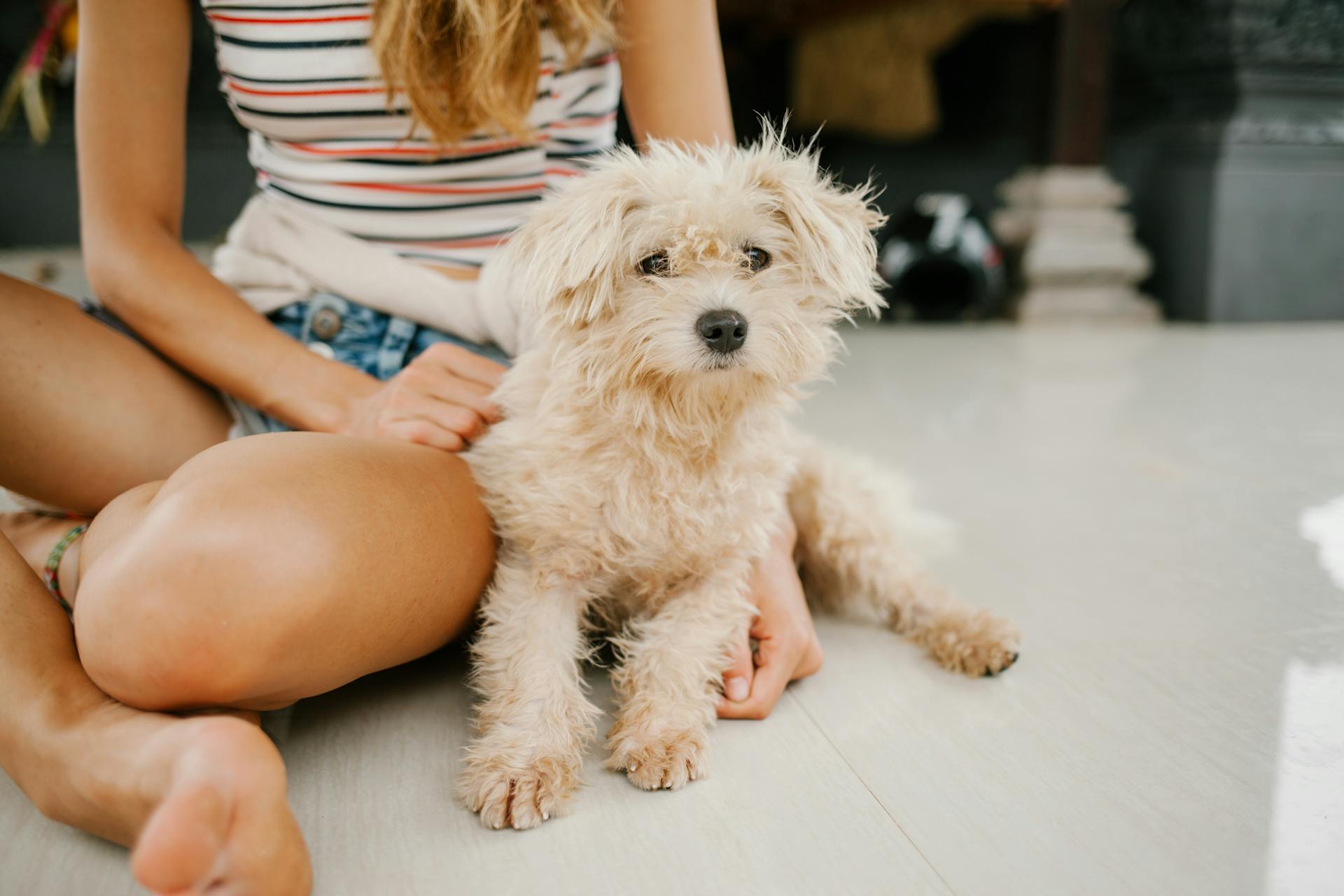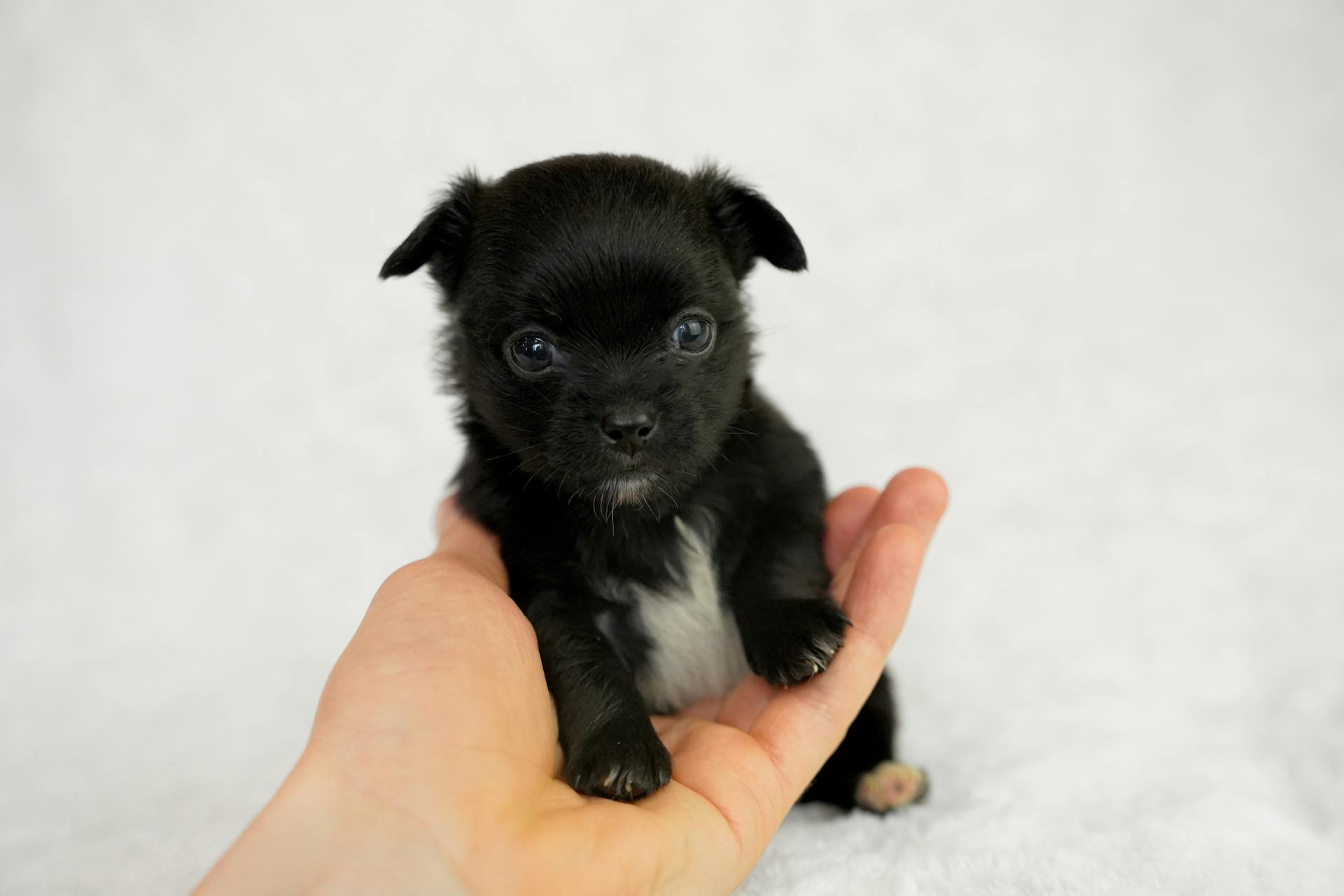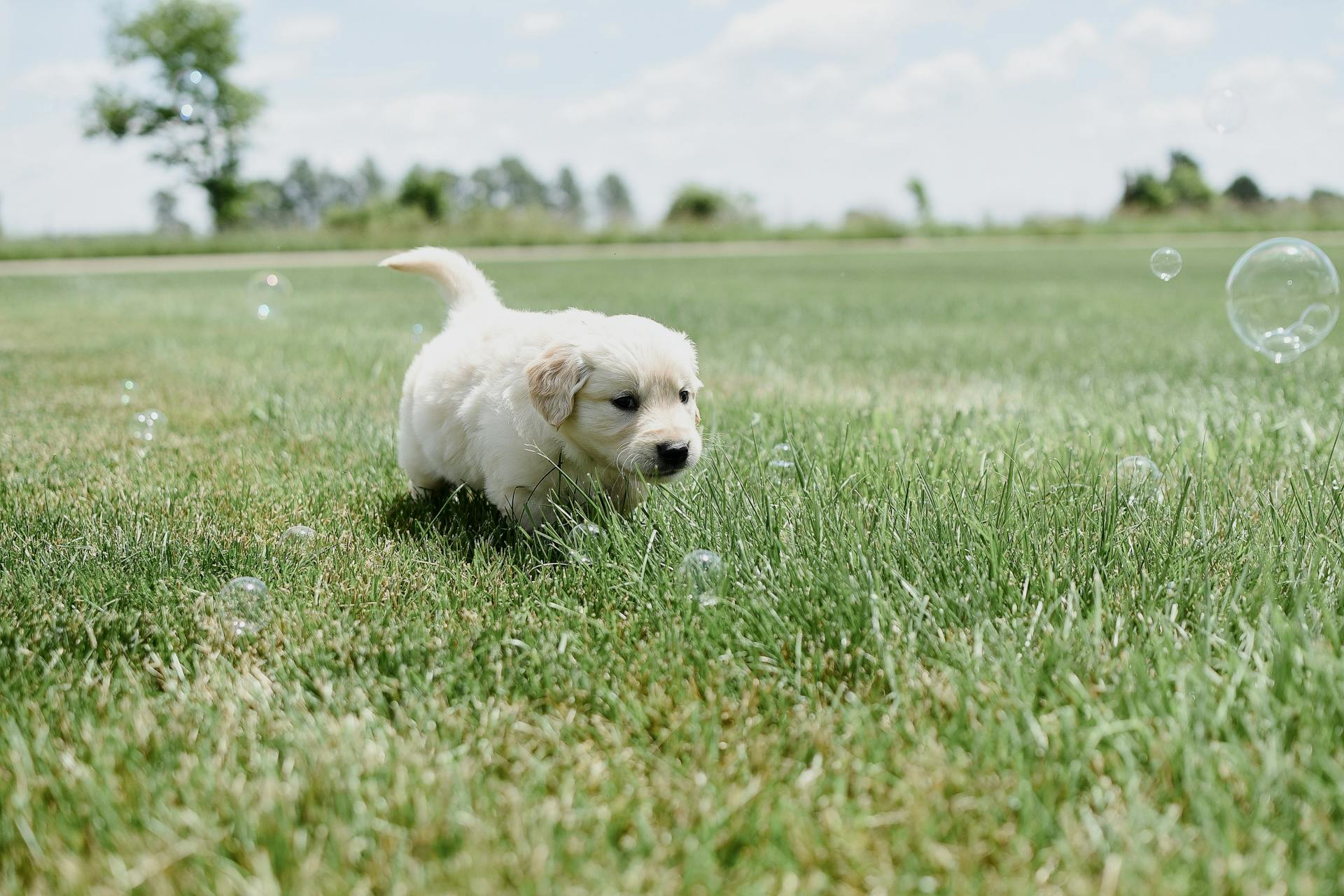
Toy Poodles can make great family pets, but it's essential to consider their temperament and needs when deciding if they're a good fit for your household with kids.
Toy Poodles are known for being intelligent and active, which can be a great asset when it comes to interacting with children. They require regular exercise and mental stimulation to prevent boredom and destructive behavior.
In general, Toy Poodles are not naturally protective of their owners, but they can be wary of strangers and may require time to warm up to new people, including children.
You might enjoy: When Do Toy Poodles Stop Growing
Temperament and Suitability
Toy poodles are incredibly smart and tend to consider themselves a vital part of the family, which can be both a blessing and a curse. They have strong personalities and learn things in a flash, but can also develop common stress behaviors associated with separation anxiety.
Their intelligence helps them learn games they can play with kids, such as hide and seek, but also means they quickly learn what is expected of them and can act out of spite if they feel left out. Toy poodles are eager to please and will quickly come to love the praise and appreciation that comes with good behavior.
Toy poodles can thrive in small apartments or full-sized homes, but need special care to ensure they get their energy out in an appropriate manner. They're highly energetic and playful, and need training to keep them focused on a task that will test their mind or train their agility.
Here are some age-specific guidelines for introducing a toy poodle into a family with children:
- Toddlers (0-3 years): Choose a puppy or adult dog with a calm temperament and supervise interactions closely.
- Preschoolers (3-5 years): Teach your kids to be gentle and respectful of the dog's boundaries.
- School-Age Kids (6-12 years): Toy poodles are a good fit here, as they enjoy playtime and companionship.
- Teens and Beyond (13+ years): Older kids can take on more significant responsibilities, like walking and feeding the dog.
Toy Poodle Temperament
Toy Poodles are incredibly smart and consider themselves a vital part of the family, often getting disgruntled if they think they're being left out of family activities.
Their intelligence comes with a downside, as they quickly learn what is expected of them and can act out of spite if they feel ignored. This is especially true if they're not obedience trained.
Toy Poodles are devoted family pets who love to be the center of attention, learn tricks, and take walks. They excel in agility and obedience training and will play with children for hours.
If this caught your attention, see: Poodle Family Dog
Their intelligence also makes them quick to learn complex games like hide and seek. However, this intelligence can also lead to common stress behaviors associated with separation anxiety.
With proper socialization, toy poodles have no problem with other dogs, cats, or children. They are very affectionate towards their human family and are eager to please, making them a crucial part of any family.
However, they can be passive-aggressive if left alone for too long or not given enough attention. This is why it's essential to train them as quickly as possible.
Here's a breakdown of the different age groups and how they interact with toy poodles:
Remember, it's crucial to teach your kids about dog safety, including how to approach, handle, and respect the family pet.
Are Toy Poodles Good with Kids
Toy Poodles can be a great match for families with kids, as they are known to be gentle and even-tempered.
Their small size makes them a good choice for families who live in apartments or have limited space.
Toy Poodles are highly intelligent and easy to train, which means they can learn to behave well around children.
However, they do require regular grooming to prevent matting and tangling of their fur.
With proper socialization and training, Toy Poodles can thrive in households with kids and even become great playmates.
Their high energy level means they need regular exercise and mental stimulation to prevent boredom and destructive behavior.
Toy Poodles are generally good with children if they are introduced properly and at a young age, but it's essential to supervise interactions between the dog and kids to ensure everyone's safety.
Family Environment and Training
Training a toy poodle for a family environment is crucial, especially if you have kids. They are highly intelligent and quick learners, making them relatively easy to train with positive reinforcement techniques like treats and praise.
Training them in basic obedience and how to interact with children is essential for a harmonious family life. With vigilant training and rewarding good behavior, you can counter any negative habits that may arise from their intelligence.
Discover more: Miniature Poodle Training
Toy poodles are eager to please and will quickly learn to love the praise and appreciation that comes with good behavior. They are highly adaptable and can thrive in both small apartments and full-sized homes, but special care must be taken to ensure they get their energy out in an appropriate manner.
Here are some key takeaways to keep in mind:
- Train your toy poodle in basic obedience and how to interact with children.
- Use positive reinforcement techniques like treats and praise.
- Be vigilant in training and rewarding good behavior.
Family Environment Training
Family Environment Training is crucial for creating a harmonious household with your Toy Poodle. Socialization is critical for Poodles, especially in households with children, and helps them develop into well-rounded and adaptable dogs.
A well-socialized Poodle is more likely to be comfortable and gentle around children, which is essential for a family environment. Toy Poodles tend to be good with kids, but individual temperament varies, so it's essential to observe their behavior around children.
To ensure a smooth transition, teach your child how to play and gently handle the tiny dog to prevent him from getting hurt. Positive reinforcement techniques, such as treats and praise, are effective with Poodles and make training a breeze.
Explore further: Dog Training with Toys

Training them in basic obedience and how to interact with children is essential for a harmonious family life. This includes temperaments checks, observing behavior around kids, and understanding their energy levels.
Here are some key things to consider when training your Toy Poodle:
- Temperament Check: Spend time with the puppy and see if they're friendly, outgoing, and comfortable with new experiences.
- Behavior Around Kids: Observe how the puppy interacts with your children.
- Energy Level: Keep an eye on their energy level and ask the breeder or current caretaker about the pup's energy levels throughout the day.
- Health History: Ask the breeder for the puppy's health records and check with your veterinarian about their policies and your breeder to understand if early vaccinations are an extra charge.
Creating a Safe and Nurturing Space
Creating a safe environment for both children and pets is crucial. Supervision during interactions is key to prevent accidental injuries and ensure positive experiences for all.
A safe space for pets is just as important as one for children. Providing a safe area for your dog to retreat to can help reduce stress and prevent unwanted interactions.
Supervising interactions between children and pets is essential. This includes teaching children how to interact with the dog appropriately, such as gentle petting and no teasing.
Setting boundaries and rules for interacting with pets is vital. This helps children understand what is expected of them and prevents accidents.
By creating a safe and nurturing space, you can help your family bond with your pets in a positive way. This includes teaching children how to interact with the dog appropriately and providing the dog with a safe space.
Poodle Mixes Explained
Poodle mixes can be a great fit for families, offering a unique combination of traits from both parent breeds. These mixes are often friendly and affectionate, making them great family pets.
Cockapoos, for example, are known for being great with kids, thanks to their friendly and outgoing personalities. They're a mix of Toy Poodle and Cocker Spaniel, and are often playful and energetic.
Maltipoos, on the other hand, are tiny but terrific companions, making them a great choice for families with smaller living spaces. They're a blend of Toy Poodle and Maltese, and are often good with kids.
Yorkipoos are another popular Poodle mix, and are known for being small, energetic, and loyal companions. They can be a great fit for families with active kids who love to play.
Here are some common characteristics of Poodle mixes:
Creating a Safe Space
Creating a safe space for both kids and toy poodles is crucial. Supervision during interactions is key to prevent accidental injuries and ensure positive experiences for both parties.
Teaching children how to interact with toy poodles appropriately is vital. This includes showing them how to gently pet, feed, and play with the dog.
Providing a safe space for the dog is also essential. This can be a crate or a designated area where the dog can retreat when feeling overwhelmed.
Setting clear boundaries and rules for interacting with the dog is important. This helps children understand what is and isn't acceptable behavior around the toy poodle.
Toy Poodle Basics
Toy Poodles can make great family pets, but it's essential to understand their temperament and needs. A well-socialized pup is a great sign, so spend time with the puppy to see if they're friendly, outgoing, and comfortable with new experiences.
Toy Poodles tend to be good with kids, but individual temperament varies. Observe how the puppy interacts with your children: are they gentle, playful, and patient?
To ensure a harmonious household, keep an eye on the puppy's energy level. Toy Poodles are active, but you don't want a pup that's constantly bouncing off the walls. Ask the breeder or current caretaker about the pup's energy levels throughout the day.
For another approach, see: Are Great Pyrenees Good with Kids
Here are some key things to consider when introducing a Toy Poodle to your family:
- Temperament Check: Look for a friendly, outgoing, and comfortable pup.
- Behavior Around Kids: Observe gentle, playful, and patient interactions.
- Energy Level: Ensure the pup isn't too energetic or hyperactive.
- Health History: Ask for vaccination records and be aware of potential genetic issues.
Playtime
Playtime is a great way to bond with your Toy Poodle, and they generally have a moderate to high energy level.
To keep playtime safe and controlled, especially with younger children, it's essential to supervise their interactions.
Poodles enjoy playtime and can make great companions for kids, but it's crucial to ensure the play remains safe.
With proper supervision, playtime can be a wonderful way to exercise your Toy Poodle and strengthen your relationship.
Toy Poodle Puppies: 101 Basics
Toy poodles make wonderful family pets, and with the right approach, you can ensure a happy and harmonious home. Toy poodles are highly intelligent and devoted, making them a crucial part of any family.
To get a sense of a toy poodle's temperament, spend time with the puppy and see if they're friendly, outgoing, and comfortable with new experiences. A well-socialized pup is a great sign.
Toy poodles are known to be good with kids, but individual temperament varies. They tend to be gentle, playful, and patient, making them a great match for families with children.
Toy poodles are active, but you don't want a pup that's constantly bouncing off the walls. Keep an eye on their energy level to ensure they're getting enough exercise and mental stimulation.
To ensure you're getting a healthy puppy, ask the breeder for the puppy's health records. It's essential to know about vaccinations and any potential genetic issues.
Here are some key things to consider when getting a toy poodle puppy:
- Temperament Check: Look for a friendly, outgoing, and comfortable pup.
- Behavior Around Kids: Observe how the puppy interacts with your children.
- Energy Level: Keep an eye on their energy level to ensure they're getting enough exercise and mental stimulation.
- Health History: Ask the breeder for the puppy's health records.
Frequently Asked Questions
What are the cons of having a Toy Poodle?
Toy Poodles can be sensitive to sudden noises and may flinch easily, while also requiring a peaceful household environment to thrive. They may become emotionally upset if exposed to excessive activity or conflict.
Is a Toy Poodle a high maintenance dog?
A Toy Poodle is considered moderately high maintenance due to daily grooming needs. However, their low-shedding coat makes them a great choice for those willing to commit to regular grooming.
Featured Images: pexels.com


